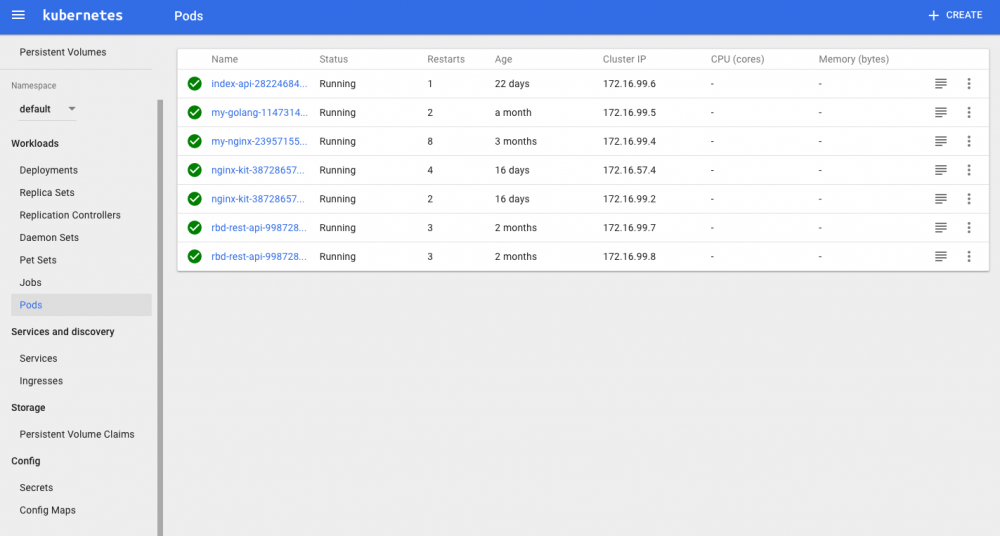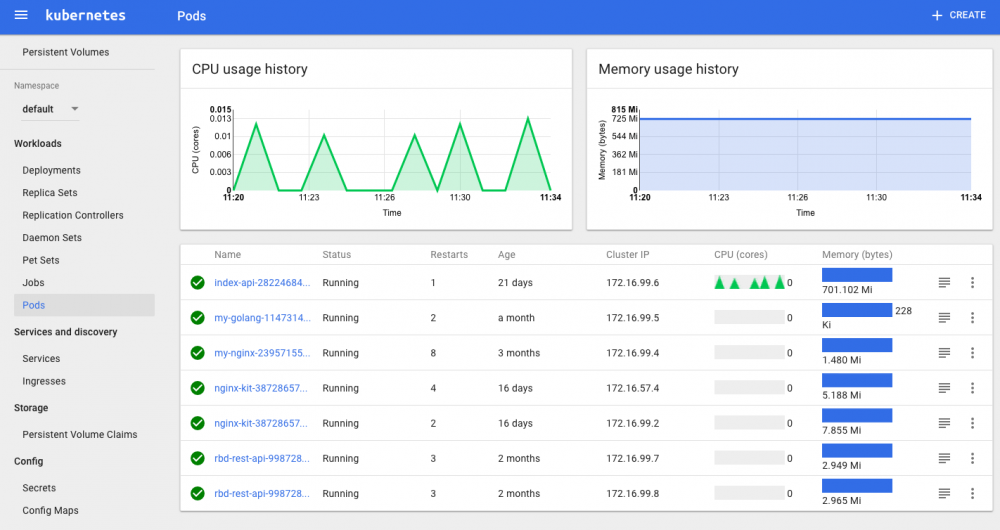Kubernetes Dashboard集成Heapster
默认安装后的Kubernetes dashboard 如下图所示,是无法图形化展现集群度量指标信息的:

图形化展示度量指标的实现需要集成k8s的另外一个Addons组件: Heapster 。
Heapster原生支持K8s(v1.0.6及以后版本)和 CoreOS ,并且支持多种存储后端,比如: InfluxDB 、 ElasticSearch 、 Kafka 等,这个风格和k8s的确很像:功能先不管完善与否,先让自己在各个平台能用起来再说^0^。这里我们使用的数据存储后端是InfluxDB。
一、安装步骤
我们的Heapster也是要放在pod里运行的。当前,Heapster的最新stable版本是 v1.2.0 ,我们可以下载其 源码包 到K8s cluster上的某个Node上。解压后,我们得到一个名为”heapster-1.2.0″的目录,进入该目录,我们可以看到如下内容:
root@node1:~/k8stest/dashboardinstall/heapster-1.2.0# ls code-of-conduct.md CONTRIBUTING.md docs Godeps hooks integration LICENSE metrics riemann version common deploy events grafana influxdb kafka Makefile README.md vendor
以 InfluxDB为存储后端的Heapster 部署yaml在deploy/kube-config/influxdb下面:
root@node1:~/k8stest/dashboardinstall/heapster-1.2.0# ls -l deploy/kube-config/influxdb/ total 28 -rw-r--r-- 1 root root 414 Sep 14 12:47 grafana-service.yaml -rw-r--r-- 1 root root 942 Jan 20 15:15 heapster-controller.yaml -rw-r--r-- 1 root root 249 Sep 14 12:47 heapster-service.yaml -rw-r--r-- 1 root root 1465 Jan 19 21:39 influxdb-grafana-controller.yaml -rw-r--r-- 1 root root 259 Sep 14 12:47 influxdb-service.yaml
这里有五个yaml(注意:与heapster源码库中最新的代码已经有所不同,最新代码将influxdb和grafana从influxdb-grafana-controller.yaml拆分开了)。其中的一些docker image在墙外,如果你有加速器,那么你可以直接执行create命令;否则最好找到一些替代品: 比如:用signalive/heapster_grafana:2.6.0-2替换gcr.io/google_containers/heapster_grafana:v2.6.0-2。
创建pod的操作很简单:
~/k8stest/dashboardinstall/heapster-1.2.0# kubectl create -f deploy/kube-config/influxdb/ service "monitoring-grafana" created replicationcontroller "heapster" created service "heapster" created replicationcontroller "influxdb-grafana" created service "monitoring-influxdb" created
如果image pull顺利的话,那么这些pod和service的启动是会很正常的。
//kube get pods -n kube-system ... ... kube-system heapster-b1dwa 1/1 Running 0 1h 172.16.57.9 10.46.181.146 k8s-app=heapster,version=v6 kube-system influxdb-grafana-8c0e0 2/2 Running 0 1h 172.16.57.10 10.46.181.146 name=influxGrafana ... ...
我们用浏览器打开kubernetes的Dashboard,期待中的图形化和集群度量指标信息到哪里去了呢?Dashboard还是一如既往的如上面图示中那样“简朴”,显然我们遇到问题了!
二、TroubleShooting
问题在哪?我们需要逐个检视相关Pod的日志:
# kubectl logs -f pods/influxdb-grafana-xxxxxx influxdb -n kube-system # kubectl logs -f pods/influxdb-grafana-xxxxxx grafana -n kube-system # kubectl logs -f pods/heapster-xxxxx -n kube-system
在heapster-xxxxx这个pod中,我们发现了大量失败日志:
E0119 13:14:37.838900 1 reflector.go:203] k8s.io/heapster/metrics/heapster.go:319: Failed to list *api.Pod: the server has asked for the client to provide credentials (get pods) E0119 13:14:37.838974 1 reflector.go:203] k8s.io/heapster/metrics/processors/node_autoscaling_enricher.go:100: Failed to list *api.Node: the server has asked for the client to provide credentials (get nodes) E0119 13:14:37.839516 1 reflector.go:203] k8s.io/heapster/metrics/processors/namespace_based_enricher.go:84: Failed to list *api.Namespace: the server has asked for the client to provide credentials (get namespaces)
heapster无法连接apiserver,获取不要想要的信息。从kube-apiserver的日志(/var/log/upstart/kube-apiserver.log)也印证了这一点:
E0120 09:15:30.833928 12902 handlers.go:54] Unable to authenticate the request due to an error: crypto/rsa: verification error E0120 09:15:30.834032 12902 handlers.go:54] Unable to authenticate the request due to an error: crypto/rsa: verification error E0120 09:15:30.835324 12902 handlers.go:54] Unable to authenticate the request due to an error: crypto/rsa: verification error
从apiserver的日志来看,heapster是通过apiserver的secure port连接的,由于我们的 API server设置有https client端证书校验机制 ,因此两者连接失败。
三、通过insecure-port连接kube-apiserver
现在我们就来解决上述问题。
首先,我们会想到:能否让heapster通过kube APIServer的insecure-port连接呢?在《 Kubernetes集群的安全配置 》一文中我们提到过,kube-apiserver针对insecure-port接入的请求没有任何限制机制,这样heapster就可以获取到它所想获取到的所有有用信息。
在heapster doc中的“ Configuring Source ”中,我们找到了连接kube-apiserver insecure-port的方法。不过在修改yaml之前,我们还是要先来看看当前heapster的一些启动配置的含义:
//deploy/kube-config/influxdb/heapster-controller.yaml
command:
- /heapster
- --source=kubernetes:https://kubernetes.default
- --sink=influxdb:http://monitoring-influxdb:8086
我们看到heapster启动时有两个启动参数:
–source指示数据源,heapster是支持多种数据源的,这里用的是“kubernetes”类型的数据源,地址是:kubernetes.default。这个域名的全名是:kubernetes.default.svc.cluster.local,就是service “kubernetes”在cluster中的域名,而”kubernetes”服务就是kube-apiserver,它的信息如下:
# kubectl get services
NAME CLUSTER-IP EXTERNAL-IP PORT(S) AGE
kubernetes 192.168.3.1 <none> 443/TCP 99d
... ...
# kubectl describe svc/kubernetes
Name: kubernetes
Namespace: default
Labels: component=apiserver
provider=kubernetes
Selector: <none>
Type: ClusterIP
IP: 192.168.3.1
Port: https 443/TCP
Endpoints: xxx.xxx.xxx.xxx:6443
Session Affinity: ClientIP
No events.
因此,该域名在k8s DNS中会被resolve为clusterip:192.168.3.1。外加https的默认端口是443,因此实际上heapster试图访问的apiserver地址是:https://192.168.3.1:443。
heapster启动的另外一个参数是–sink,这个传入的就是存储后端,我们使用了InfluxDB,这里传入的就是上面创建的InfluxDB service的域名和端口号,我们在cluster中也能查找到该Service的信息:
# kubectl get services -n kube-system NAME CLUSTER-IP EXTERNAL-IP PORT(S) AGE monitoring-influxdb 192.168.3.228 <none> 8083/TCP,8086/TCP 1h ... ...
前面提到过,我们的APIServer在secure port上是有client端证书校验的,那么以这样的启动参数启动的heapster连接不上kube-apiserver就“合情合理”了。
接下来,我们按照”Configuring Source”中的方法,将heapster与kube-apiserver之间的连接方式改为通过insecure port进行:
// kube-config/influxdb/heapster-controller.yaml
... ...
command:
- /heapster
- --source=kubernetes:http://10.47.136.60:8080?inClusterConfig=false
- --sink=influxdb:http://monitoring-influxdb:8086
修改后重新create。重新启动后的heapster pod的日志输出如下:
# kubectl logs -f pod/heapster-hco5i -n kube-system I0120 02:03:46.014589 1 heapster.go:71] /heapster --source=kubernetes:http://10.47.136.60:8080?inClusterConfig=false --sink=influxdb:http://monitoring-influxdb:8086 I0120 02:03:46.014975 1 heapster.go:72] Heapster version v1.3.0-beta.0 I0120 02:03:46.015080 1 configs.go:60] Using Kubernetes client with master "http://10.47.136.60:8080" and version v1 I0120 02:03:46.015175 1 configs.go:61] Using kubelet port 10255 E0120 02:03:46.025962 1 influxdb.go:217] issues while creating an InfluxDB sink: failed to ping InfluxDB server at "monitoring-influxdb:8086" - Get http://monitoring-influxdb:8086/ping: dial tcp 192.168.3.239:8086: getsockopt: connection refused, will retry on use I0120 02:03:46.026090 1 influxdb.go:231] created influxdb sink with options: host:monitoring-influxdb:8086 user:root db:k8s I0120 02:03:46.026214 1 heapster.go:193] Starting with InfluxDB Sink I0120 02:03:46.026286 1 heapster.go:193] Starting with Metric Sink I0120 02:03:46.051096 1 heapster.go:105] Starting heapster on port 8082 I0120 02:04:05.211382 1 influxdb.go:209] Created database "k8s" on influxDB server at "monitoring-influxdb:8086"
之前的错误消失了!
我们再次打开Dashboard查看pod信息(这里需要等上一小会儿,因为采集cluster信息也是需要时间的),我们看到集群度量指标信息以图形化的方式展现在我们面前了(可对比本文开头那幅图示):

四、通过secure port连接kube-apiserver
kube-apiserver的–insecure-port更多用来调试,生产环境下可是说关就关的,因此通过kube-apiserver的secure port才是“长治久安”之道。但要如何做呢?在heapster的”Configure Source”中给了一种使用serviceaccount的方法,但感觉略有些复杂啊。这里列出一下我自己探索到的方法: 使用kubeconfig文件!在《 Kubernetes集群Dashboard插件安装 》一文中,我们已经配置好了kubeconfig文件(默认位置:~/.kube/config),对于kubeconfig配置项还不是很了解的童鞋可以详细参考那篇文章,这里就不赘述了。
接下来,我们来修改heapster-controller.yaml:
// deploy/kube-config/influxdb/heapster-controller.yaml
... ...
spec:
containers:
- name: heapster
image: kubernetes/heapster:canary
volumeMounts:
- mountPath: /srv/kubernetes
name: auth
- mountPath: /root/.kube
name: config
imagePullPolicy: Always
command:
- /heapster
- --source=kubernetes:https://kubernetes.default?inClusterConfig=false&insecure=true&auth=/root/.kube/config
- --sink=influxdb:http://monitoring-influxdb:8086
volumes:
- name: auth
hostPath:
path: /srv/kubernetes
- name: config
hostPath:
path: /root/.kube
... ...
从上述文件内容中–source的值我们可以看到,我们又恢复到初始kubernetes service的地址:https://kubernetes.default,但后面又跟了几个参数:
inClusterConfig=false : 不使用service accounts中的kube config信息; insecure=true:这里偷了个懒儿:选择对kube-apiserver发过来的服务端证书做信任处理,即不校验; auth=/root/.kube/config:这个是关键!在不使用serviceaccount时,我们使用auth文件中的信息来对应kube-apiserver的校验。
上述yaml中,我们还挂载了两个path,以便pod可以访问到相应的配置文件(~/.kube/config)和/srv/kubernetes下的证书。
保存并重新创建相关pod后,Dashboard下的集群度量指标信息依然能以图形化的方式展现出来,可见这种方法是ok的!
© 2017,bigwhite. 版权所有.
- 本文标签: root https 配置 时间 list core Master 目录 ip 安装 代码 Docker src IO db 安全 Google Select client Service node 集群 API Kubernetes Connection 下载 端口 cat IDE App Uber 文章 tab tar 数据 CTO provider ACE authenticate 调试 域名 参数 http id 源码 DNS UI TCP 插件 ask 服务端
- 版权声明: 本文为互联网转载文章,出处已在文章中说明(部分除外)。如果侵权,请联系本站长删除,谢谢。
- 本文海报: 生成海报一 生成海报二











![[HBLOG]公众号](https://www.liuhaihua.cn/img/qrcode_gzh.jpg)

